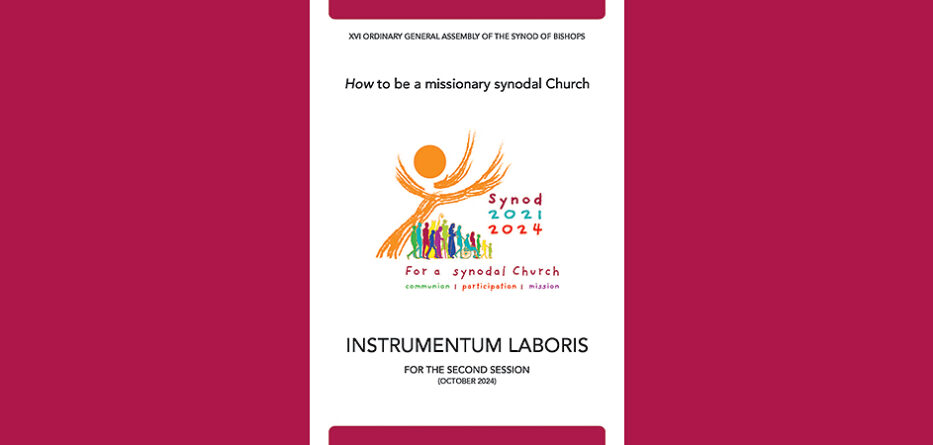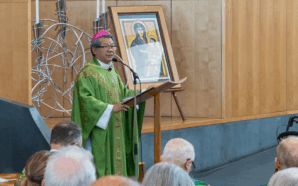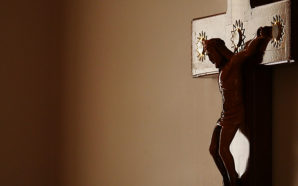Homily for the 15th Sunday in Ordinary Time, Year B
Readings: Amos 7:12-15; Psalm 84(85):9-14; Ephesians 1:3-14; Mark 6:7-13
14 July 2024
On Tuesday, 4 male clerics gave a press conference at the Vatican releasing the Instrumentum Laboris, the working document for the next session of the Synod to be held in October.[1] The document is entitled ‘How to be a missionary synodal church’. The document notes: “Without tangible changes, the vision of a synodal Church will not be credible. This will alienate those members of the People of God who have drawn strength and hope from the synodal journey. This applies most especially to the effective participation of women in drafting and decision-making and taking processes”[2]. You’d think they could have started with a woman member of the Synod presenting some remarks at the press conference announcing the next steps of the Synod to the world. But no, it was back to the old time Vatican approach, despite some splendid words of inclusion and transparency in the document, with the male clerics announcing the way forward. For example, the document states: “It is difficult to imagine a more effective way to promote a synodal Church than the participation of all in decision-making and taking processes. This participation takes place based on a differentiated responsibility that respects each community member and values their respective skills and gifts in view of a shared decision.”[3] When asked about the four gentlemen in Roman collars presenting the document, Cardinal Jean Claude Hollerich SJ, the relator general of the synod, “said that greater diversity is ‘the ideal situation where we want to go,’ but that the four European clerics at the dais are ‘the actual situation.’”[4]
LISTEN: https://soundcloud.com/frank-brennan-6/homily-14724
I have confessed to some fatigue and frustration with the synod process since Pope Francis’ interview on CBS television on 20 May 2024 when he said unequivocally that he was ruling out the possibility of ordaining women deacons. He was asked if women would ever have “the opportunity to be a deacon and participate as a clergy member in the church”. Francis answered promptly and unambiguously, “No”. When pressed by the CBS reporter, he explained: “If it is deacons with Holy Orders, no. But women have always had, I would say, the function of deaconesses without being deacons, right? Women are of great service as women, not as ministers, as ministers in this regard, within the Holy Orders.”[5]
In this new document, there is a section entitled: ‘Sisters and brothers in Christ: a renewed reciprocity’. It states: “The first difference we encounter as human persons is between men and women. Our vocation as Christians is to honour this God-given difference by living within the Church a dynamic relational reciprocity as a sign for the world.”[6] Talk of reciprocity and difference is fine provided that the inherent human dignity of all human persons is affirmed equally. If equality is absent, talk of reciprocity and difference can become a foil for ongoing, traditional, unwarranted, adverse discrimination.
Acknowledging that “God chose women as the first witnesses and heralds of the Resurrection”, the document affirms that “By virtue of Baptism, women enjoy full equality, receive the same outpouring of gifts from the Spirit, and are called to the service of Christ’s mission.”[7] We are all called to “a conversion to a vision of relationality, interdependence and reciprocity between women and men, who are sisters and brothers in Christ, oriented to a common mission. The communion, participation and mission of the Church suffer the consequences of a failure to transform relationships and structures.”[8]
After speaking of a multitude of ways in which women can be given more responsibility in seminaries and on canonical tribunals, the document then comes to the hot button issue of women’s ordination and kicks the can further down the road:
“While some local Churches call for women to be admitted to the diaconal ministry, others reiterate their opposition. On this issue, which will not be the subject of the work of the Second Session, it is good that theological reflection should continue, on an appropriate timescale and in the appropriate ways. The fruits of Study Group 5, which will take into consideration the results of the two Commissions that have dealt with the question in the past, will contribute to its maturation.”[9]
Study Group 5, like all 10 study groups, will not complete its work until June 2025, seven months after the conclusion of the synod. However the Study Group will present a progress report to the Synod in October.
Here in Australia, where women’s equal participation in all aspects of public life has accelerated rapidly this past generation, it is not surprising that young women, and young people generally, take exception to a Church where all offices are not open to men and women. As we continue to discern the action of the Spirit in our Church let’s take heart from the observation in the Instrumentum Laboris:
“Adopting a synodal style enables us to overcome the idea that all Churches must necessarily move at the same pace on every issue. On the contrary, differences in pace can be valued as an expression of legitimate diversity and an opportunity for the exchange of gifts and for mutual enrichment. In order to be realised, this horizon needs to be embodied in concrete structures and practices.”[10]
Let’s hope our bishops are prepared to step out, if even ahead of their colleagues in Rome.
If you’re like me, feeling a little fatigued and frustrated by the endless circling of the synod process, looking for a place to land on the changes we think are needed in our Church, you can take some inspiration from today’s readings. Seeing the four male clerics deliver the document at the Vatican press conference, you might feel a bit like the prophet Amos who was told he had no place in the royal sanctuary, the national temple. Amos pleaded, “I was a shepherd, and looked after sycamores: but it was the Lord who took me from herding the flock, and the Lord who said, ‘Go, prophesy to my people Israel.’” The Instrumentum Laboris acknowledges:
“The journey so far has led to the recognition that a synodal Church is a Church that listens, is capable of welcoming and accompanying, and is perceived as home and family. A need emerges in all continents concerning people who, for different reasons, are or feel excluded or on the margins of the ecclesial community or who struggle to find full recognition of their dignity and gifts within it. This lack of welcome leaves them feeling rejected, hinders their journey of faith and encounter with the Lord, and deprives the Church of their contribution to mission.”[11]
Like the twelve in today’s gospel, we need to travel light – taking nothing for the journey other than our lived experience and our reflection on that experience in the light of the gospels and of our Catholic tradition. We need to depend on the hospitality of others who care for us in our isolation and alienation. And, if push comes to shove, we need to be willing to walk away shaking the dust from our feet as a sign to those who will not listen and who will not change. Whatever our frustrations with the institutional church in the era of change, ageing and diminishment, we are urged to be ‘pilgrims of hope’ continuing “to advance along the synodal path towards those who still await the proclamation of the Good News of salvation!”[12]
From the start of 2024, Fr Frank Brennan SJ will serve as part of a Jesuit team of priests working within a new configuration of the Toowong, St Lucia and Indooroopilly parishes in the Archdiocese of Brisbane. Frank Brennan SJ is a former CEO of Catholic Social Services Australia (CSSA). Fr Frank’s latest book is An Indigenous Voice to Parliament: Considering a Constitutional Bridge, Garratt Publishing, 2023 and his forthcoming book is ‘Lessons from Our Failure to Build a Constitutional Bridge in the 2023 Referendum’ (Connor Court, 2024).
[1] See https://www.synod.va/en/news/the-instrumentum-laboris.html
[2] How to be a missionary synodal church, Instrumentum Laboris for the Second Session (October 2024) #71, available at https://www.synod.va/en/the-synodal-process/phase-2-the-discernment-of-the-pastors/the-second-sessionofthe-XVI-assembly1/the-instrumentum-laboris.html
[3]Ibid, #67
[4] See https://www.ncronline.org/vatican/vatican-news/vatican-synod-agenda-focuses-participation-and-inclusion-not-hot-button-issues
[5] See https://cruxnow.com/vatican/2024/05/pope-francis-tells-cbs-news-women-cannot-receive-holy-orders-even-as-deacons
[6] How to be a missionary synodal church, #13
[7] Ibid, #13
[8] Ibid, #14
[9] Ibid, #17
[10] Ibid, #95
[11] Ibid, #33
[12] Ibid, #112








